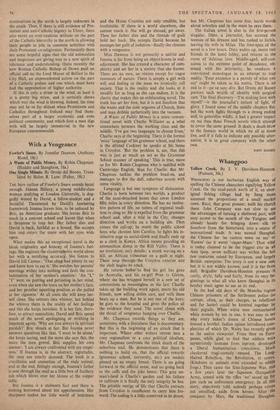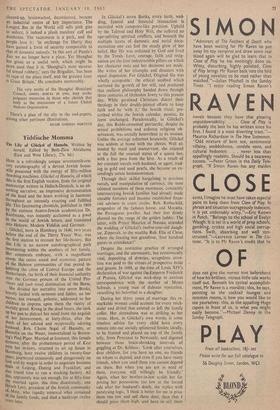Whangpoo
Yellow Creek. By J. V. Davidson-Houston. (Putnam, 30s.)
WHANGPOO is our barbarian English way of spelling the Chinese characters signifying YelloW Creek. On the mud-patch north of it, an abor- iginal fishing village had by Sung times assumed the proportions of a small market town. Ricci, that great pioneer, built his Church there. John Company was not slow to see the advantages of turning a sheltered port, with easy access to the mouth of the Yangtze, and already handy for bringing down silk to Soochow from the hinterland, into a centre of international trade. It was named Shanghai, the Chinese for 'an eastern town on sea' or `Easton' (as it were) `-super-Mare.' Thus what is today claimed to be the biggest city in all Asia (pop. seven million) was within the last few centuries raised by European, and largely British, enterprise. The story is not a new one, but it is not widely known, and it is far from dull. Brigadier Davidson-Houston presents it curtly, dryly, fully and fairly, from its very be- ginnings to what all who knew Shanghai in its heyday must agree to see as its end.
In the bad old days of the Manchu regime Chinese prisoners of the Settlement police (as corrupt, often, as their charges, as rebellious and far lazier) could be knotted together be their pigtails. When white men outnumbered white women• by ten to one, it was easy to see why every baker's dozen of Chinese hovels housed a brothel. Indian opium introduced corn- plexities of which Dr. Waley has recently given us the native viewpoint. From then on Euro- peans, while glad to find that addicts were mysteriously immune from leprosy, developed a liberal humanitarian - conscience. Much checkered tragi-comedy ensued. The Long- Haired Rebellion, the Revolution, et cetera. (Kindness to animals even extended to edible frogs.) Then came the Sino-Japanese War, and a few years later the Japanese Occupation Army, armed with the rifles 'we' saved up for just such an unforeseen emergency. In all this story, objectively told, nobody perhaps coaxes out unsullied, aside from heroes, After the conquest by Mao, the traditional Shanghai, cleaned-up, brainwashed, decorticated, became an industrial centre of key importance. The Longest Bar in the World still sells pink gins to sailors; is indeed a plush matelots' caff and dosshouse. The racecourse is a park, and the people love it: 'in exchange for liberty they have gained a form of security comparable to that of domestic animals.' In this sort of Panda's Zoo we no longer have a place. Yet Shanghai has given us a useful verb, which might be more used than it is. 'Shanghai's most success- ful armed robbery,' says the Brigadier, 'has been its rape of the place itself, and the greatest loser is Great Britain.' He concludes memorably:
The very motto of the Shanghai Municipal Council, OMNIA JUNCTA tr4 uNo, may evoke poignant memories in those who cherish that body as the microcosm of a future United Nations Organisation.
There's a plan of the city in the end-papers, among other pertinent illustrations.
HUGH GORDON PORTEUS































 Previous page
Previous page